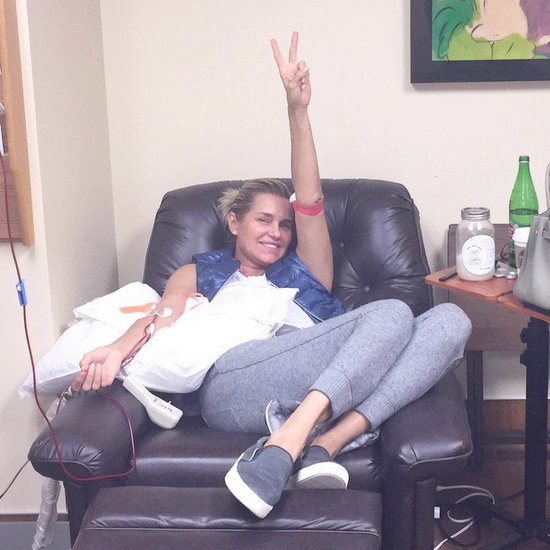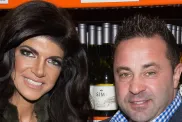On the heels of her book title and cover reveal, Yolanda Foster has been honored with another award for her efforts to bring awareness about chronic Lyme disease. The Real Housewives of Beverly Hills star was awarded with a Lifetime Achievement Award by ProHealth, Inc.
The founder of the company shared in a press release, “We’re honored to award Yolanda Hadid with a Lifetime Achievement Award for her efforts to foster awareness about chronic Lyme disease and for her courage and willingness to share her story publicly, as she also battles to recover from Lyme.”
Yolanda gave a long and interesting interview to ProHealth, Inc writer Connie Strasheim. A few excerpts are below and you can read the full interview here. It’s absolutely worth the read. Below Yolanda explains the timeline of her initial diagnosis of Lyme and even claims that her book will prove the existence of chronic Lyme.
Yolanda: “Before I got sick, I was a hardworking multi-tasking butterfly that could do anything. Nothing was ever too much for me! I was a single mom raising three kids in Santa Barbara. I was a busy bee, always going, 24-7.
Then, I started to have flu-like symptoms that were cyclical; I would have severe joint pain, and it was as if I would get a bad flu every two weeks. But when you are such a high functioning person, as I was, you always find an excuse for the symptoms. I told myself that I was working too hard, or that I was driving too much, or that I wasn’t getting enough sleep—things like that. So I went through a whole denial stage at first.
I went to Germany and tried lamb stem cell therapy, which ended up helping me remarkably. Literally overnight, the joint pain disappeared. But I continued to have severe fatigue, as neurological and brain symptoms started to set in. For instance, I started to not recognize people, was suddenly bothered by noise and began to have memory issues—that sort of thing. I saw many doctors, all of whom tried to treat the symptoms rather than get to the root cause of what was wrong with me.
I did that for maybe a year before moving to Malibu in 2011, right before I got married. Then, I remember being in the gym one day, getting ready for my wedding, and all of a sudden I realized that I couldn’t do one more push-up. I looked at my husband-to-be (David Foster) and said, “You know what? I’m done. I can’t work out one more day.” Five years have passed, and I haven’t been to the gym or worked out like that since.
In the meantime, while I was in Malibu, I continued to see doctors but everyone around me was saying things like, “You are (feeling badly because) you’re doing too much; between getting ready for your wedding, doing your show in Holland, and so on…you are overworked.” But I knew this wasn’t true, because I used to thrive on that kind of lifestyle. I told them, “That’s not what is wrong with me.”
The doctors at that time gave me a whole rundown of antidepressants and medications; things like Ritalin and Adderal, to try to speed up and improve my brain function, but none of their treatments resonated with me or made me feel better. Yet I knew something was really wrong, because I would get circles, or rings, under my eyes every 3-4 weeks that would come and go. I would tell the doctors that it was as if something like a bacteria, was growing in my brain. But the doctors would tell me that I was wrong.
At times, I would go to the hospital with severe migraines, but the doctors would always just send me back home and tell me that I had chronic fatigue syndrome. However, I knew that because of the cyclical symptoms that I had, that it wasn’t chronic fatigue syndrome; that there was something in my brain that was causing symptoms to come and go.
Then I went to Belgium to see one of the top chronic fatigue syndrome specialists in Europe, and he ran some tests on me. Six weeks later, he called me and said, “You have chronic neurological Lyme disease. You need to get a port and start intravenous antibiotic therapy.” And that’s where my healing journey really began. This was in 2012.
At the time, I didn’t know much about the difficult detoxification reactions that could happen with intravenous antibiotic treatment. These reactions occur when microbes die in the body and release neurotoxins into the bloodstream. If I had known then what I know now, I’m sure it would have been a totally different experience for me (because I could have prepared for those reactions).
Once I started the antibiotics though, it was as if my body just shut down. I would be sweating on bathroom floor, feverish, sick, and in the end, the medications didn’t really get me much better. And, as I started researching—and I’m a pretty matter of fact kind of person—I realized that there is no cure for Lyme.
Once I really started educating myself about it, I thought, okay (the research shows that) they can’t kill Lyme in a test tube, which means that popping antibiotics for long periods of time doesn’t make sense. Doing antibiotic therapy never really felt right to me, anyway.”
On her current health status, “I’ve pretty much traveled the world and exhausted every possibility of being able to figure this disease out. In the end, I took the road of “underground medicine” and studied and tried just about any and every (treatment) out there outside of conventional medicine that I thought could rebuild my body and make my immune system better. Those were a crazy five years, but now, I’m pretty stable compared to where I once was.”
“I continue to see a renowned integrative Lyme specialist, Dietrich Klinghardt, MD, PhD, every six weeks, for treatment. I also have a health advocate who works with me daily. I do a variety of treatments to eliminate the infections and rebuild my body; drips, shots, homeopathy, low-dose immunotherapy—many different things. I feel that if I keep hitting the infections from different angles that it will be beneficial and I hope and pray that one day, I will just wake up and be ready to get on with my life.”
On her book: “I am writing a book right now about my healing journey. This book is backed up with facts, research, lab tests, DNA testing, etc.—proving the existence of chronic Lyme disease. I continue to travel a very smart and intelligent journey because I’m neurotic about keeping records, test results, etc.” She adds, “It’s hard to wrap your mind around how big this disease is, though. Fortunately, I think I am about 70% of the way in my healing journey. What that means is that I have good and bad days. On the good days, I have maybe 4-5 hours where I can function, and the rest of the day I rest. I just keep on with my treatments, hoping that one day I will wake up and be better.”
Connie asks about the cancer comparisons: I have interviewed over 100 integrative Lyme disease and cancer doctors and those who treat both conditions will sometimes tell me that Lyme is just as serious and damaging to the body as cancer (sometimes even more so), and that the treatment regimens for Lyme can be even more complex. What do you think, based on the treatments you’ve received?
Yolanda: “I think that all of these diseases are bad. I never like to compare though; this is not a race, and I’m not in this to say that Lyme is worse than cancer, and I can’t give an opinion about it because I’ve never had cancer. But Lyme disease is definitely a struggle. This is not an illness for “pussies,” that’s for sure.”
“On my worst days, I sometimes think, I wish I had cancer because at least then I would understand it. I would know what to do. I would treat the cancer and then rebuild and rejuvenate my organs, and it would have an end. With this disease, there seems to be no end. It’s a trial and error disease. I pray every day that one day things will all just fall into place. But it’s not as clear of a journey as being diagnosed with cancer. That’s just a fact.”
Yolanda on the impact she’s made on others: “Honestly, I don’t really know. I live under a rock. I’ve tried to keep my job these last four years, but besides that, I don’t really have a normal, functional social life or anything. So I’m not really “out there.” But when I do get out—for instance, last night I went to the book signing for Ally Hilfiger’s new book—I realize how much impact I make on people. Because people who are crying and desperate will come up to me and thank me for sharing my story, so those are the moments when I will say to myself, Okay, I know why I’m doing this, so I need to stay focused and take this journey until the end. I have the power to take it to the finish line. So it’s in those moments that I realize the impact that I can make upon the lives of others with Lyme disease. Last night at the book signing, a young girl came up to me, and hugged me and said, “You know, because of watching you on TV, I now know what’s wrong with me, and I have been able to get the right diagnosis and treatment. I’ve been sick for half my life, but it hadn’t been for you, I would not have known I had Lyme.” These are inspiring moments for me, along with the thousands of emails and letters that I receive daily. When I look at all of these things, I realize that I need to keep going to get well, to be able to help others.”
On Bella and Anwar: “They are doing good. They are also under the care of Dr. Klinghardt. Looking at them keeps me extra motivated every day. They are young, and much more resilient than I am, fortunately.”
On what keeps her motivated: “When I get words of ignorance from the world, it makes me stronger and just creates in me a desire to fight harder. I feel very strongly that God gave me the gift of being able to deal with all of the adversity, criticism and nonsense around me. It doesn’t make me angry. Somehow, I have the ability to just let it roll of my back and keep trekking forward.”
“If I could be remembered for anything, it would be that I was able to help find a cure for Lyme. I also want to be known as someone who gives hope to others.”
TELL US – THOUGHTS ON YOLANDA’S INTERVIEW?
Photo by Instagram
The full press release about her award:
CARPINTERIA, Calif., June 9, 2016 /PRNewswire/ — Yolanda (Foster) Hadid may be best known as the star of “The Real Housewives of Beverly Hills,” but her advocacy for the chronic Lyme disease community deserves as much recognition. To that end, ProHealth, Inc. is giving the Dutch-American actress and model a well-deserved Lifetime Achievement Award. Connie Strasheim – editor of ProHealth’s Lyme disease page and author of four books on the subject – interviewed Hadid to learn more about her five-year journey with this chronic and debilitating condition.
“We’re honored to award Yolanda Hadid with a Lifetime Achievement Award for her efforts to foster awareness about chronic Lyme disease,” says ProHealth Founder Rich Carson, “and for her courage and willingness to share her story publicly, as she also battles to recover from Lyme.”
Hadid’s story began with a string of misdiagnoses and inappropriate treatments. Even when Lyme disease was finally identified, the standard treatment left her feeling even worse. That’s when she turned to alternative solutions. Today, her treatment regimen provides her with the best quality of life she has experienced since before her illness. Sadly, two of her children have been diagnosed with Lyme – an unfortunately common occurrence with this disease.
Each year in the U.S. alone, there are about 300,000 new cases of Lyme disease, and millions worldwide battle the disease. Lyme is indeed a pandemic, yet it doesn’t receive the attention warranted by the numbers.
Diagnosing Lyme disease is challenging because it mimics other chronic diseases like Parkinson’s, ALS, fibromyalgia and chronic fatigue syndrome. Many bacterial strains have yet to be identified, and testing is often inaccurate. Relatively modest research funding compounds these challenges.
Hadid intends to flip the script on Lyme disease funding and research. Despite her symptoms, she continues to work diligently to be a voice for the millions who don’t have one. She has participated in charity fundraising events, including Stand4Lyme’s Catalyst 4 The Cure concert and the Lyme Research Alliance 2015 gala. Her goal is to raise awareness today, while laying the groundwork for a cure tomorrow.
“If I could be remembered for anything, it would be that I was able to help find a cure for Lyme,” says Hadid. “I also want to be known as someone who gives hope to others.”
About ProHealth, Inc.
ProHealth is a popular patient owned and operated company that offers world-class nutritional supplements and other products designed to make life easier for Lyme disease, fibromyalgia and ME/CFS patients. For more than 25 years, ProHealth has dedicated itself to providing these patients with up-to-date research news, symptom-management information and community support through its online library of over 25,000 articles and research abstracts. ProHealth has a large following in these patient communities, with 300,000 newsletter subscribers, 400,000 Facebook followers and more than half a million website page views a month. Also avid about fundraising, ProHealth has raised and donated more than $4 million to research and awareness for Lyme, fibromyalgia and ME/CFS.








